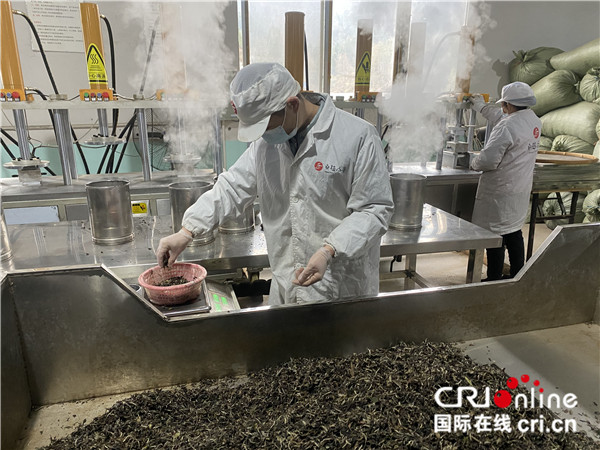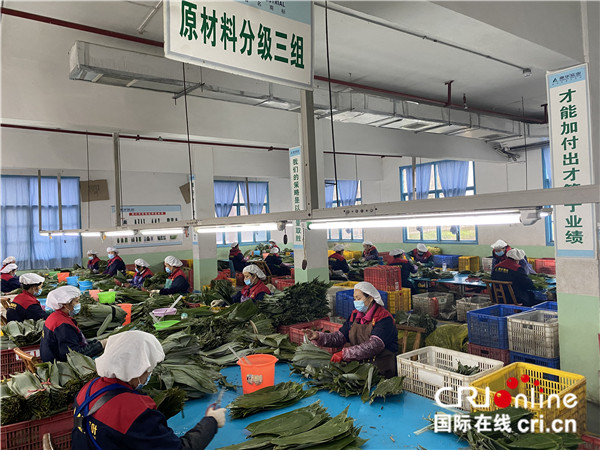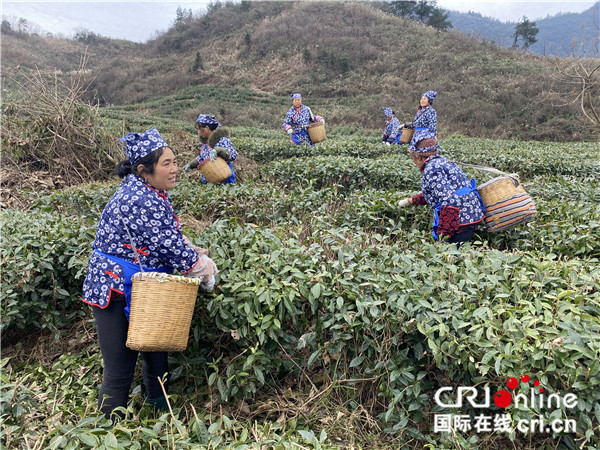
Sangzhi County is located in northwest Hunan, a contiguous poor area of Wuling Mountain, once having a poverty rate of 28.28% in 2014. CNIPA has been assisting Sangzhi County to escape from poverty since 1994 by fostering GI products, and has accumulated experience for the rest of the world. Today, Sangzhi has become an example for the world on how to use IP for poverty eradication.
Machines are running in the workshop of Hunan Xiangfeng Sangzhi White Tea Co., Ltd in Hongjiaguan Town. Li Yanping, from an impoverished family, has to take care of her bedridden husband paralyzed 10 years ago and their son who is studying at school. For her, living standards have greatly improved after she joined the tea factory this March with a monthly salary of 3,000 to 4,000 yuan. "We live a much better life now since I worked here. It's only a 20-minute bike ride. I can have the time to take care of my family and have a stable income. It's really good. Thank Sangzhi White Tea Company so much," said Li.
Today, "Sangzhi White Tea" has been listed as a protected product of China's national geographical trademark. A GI is a sign to show a product has a specific geographical origin and possesses qualities or a reputation due to that origin. As of today, white tea plantations in the county have reached a cumulative area of 79,000 mu (5,266.67 hectares), with 6 enterprises above designated size, 95 specialized farmer cooperatives, and more than 20 sub-brands of "Sangzhi White Tea". The white tea industry has helped about 74,500 people get employment, with 1/3 of them from low-income families.

In addition to white tea, Sangzhi has also nurtured other GIs, including "Zhangjiajie Giant Salamander", "Sangzhi Konjac", "Sangzhi Honey", "Sangzhi Radish" and "Kanghua Reed Leaves", among which "Kanghua Reed Leaves" has been recognized as a China Famous Trademark this year. As of today, a total of 40,000 farmers have been employed in the business, helping 12,000 people cast off poverty.
Shi Peng, a poverty-alleviation official sent by the administration to Cangguanyu Village in Sangzhi County, told reporters that CNIPA has always taking GI cultivation as an important measure to promote local economic development and targeted poverty reduction. "With the establishment of GIs and famous trademarks, industrial scales at the county level have been largely increased. For farmers, especially the low-income families, they used to plant some crops on their farmlands; but now, they can earn RMB 200-300 yuan for each mu through land transfer; and in addition, they can earn another RMB 80-100 yuan every day from their labor. This way, they can have a stable income without going to outside. This is a sustainable and relatively stable industry, which both increases farmers' income and bring them the hope for life. They are full of hope for shaking off poverty and preventing the reoccurrence of poverty after being lifted out. Such hope is the strongest support for rural revitalization," said Shi.

Zhao Yunhai, head of Sangzhi County, said that the output value of Sangzhi white tea and Sangzhi reed leaves industries has reached 450 million yuan, which has greatly improved local people's life. “With the purpose of 'Build a brand, grow a powerful industry, benefit the locals', CNIPA and Sangzhi focused on poverty eradication through the use of IP. This is a new path carved out by relying on local advantages and resources,” said Zhao.
Liu Hua, director of the World Intellectual Property Organization Office in China, said that WIPO has noted with appreciation the successful story of China in poverty eradication through IP and hoped China will share its experiences with the world, especially with the developing countries. "Education and investment are widely-known tools applied in the poverty alleviation fight in other places. IP-based poverty alleviation is a special example. Thanks to this knowledge-based and high-tech project launched by CNIPA, the concept of poverty eradication through IP has been known to and benefited more people," Liu added.